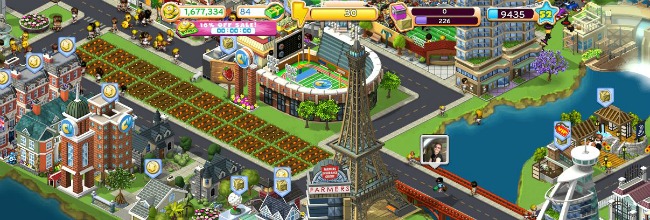Since social gaming tycoon company Zynga launched a few years back, I’ve been a huge skeptic and opponent of the phenomenon, considering it mostly to be spam. Today, I put my head down to write this and admit that I have become nearly addicted to Zynga’s Farmville spinoff game, Cityville.
On occasion, I had played Texas HoldEm Poker for lack of a decent app (or any easily accessed software, period) for my favorite card game, Spades, on Facebook. After discovering Chrome apps and looking for something other than Angry Birds to play when attempting to save my cellphone’s battery life, I found Cityville … which I was willing to play as an app on my Chrome browser. It tricked me and took me to the Cityville Facebook app webpage instead, but I figured since I can only play The Sims 3 on my Asus Gamer Nation laptop and not my X-series Lenovo, it could be worth a shot.

Combining the desire to become a city-building tycoon (a la Sim City) and an excuse to interact with Facebook friends you wouldn’t otherwise are the two main appealing aspects of this uber-popular Facebook game. So, can you “build the city of your dreams?” Yes, so long as you have either the Facebook credits or patience to do so. Cityville is another in a long line of many “freemium” apps and games available on the ‘net. You can either choose to take ages to earn the “City Cash” and “energy” needed to buy and build so-called “premium” items (like “supplies” to complete buildings you’ve already purchased with earned “city coins”) or you can buy it outright for $5 per 40 “city cash” or 7,500 “city coins.” Want to buy energy? Then you’ll need to spend 3 “city cash” bucks for 3 energy points, each of which will be used for essentially every single action.

With the high cost of the game (literally), you’d think it’d turn off people … right? Wrong. You can also earn items by dragging your friends into it and encouraging them to play the game so you can get supplies you need to expand your city. And Zynga isn’t the only one taking advantage of Facebook users’ desire for power. Companies like State Farm Insurance, McDonald’s, Citibank, Best Buy and personalities like Lady Gaga and Enrique Iglesias have used the uber-popular Cityville to implement some creative advertising for their brand that users can interact with.
So, in the end, is social gaming evil? Yes. It capitalizes on teens’ and young adults’ addiction to the web and social networking. Is it smart business? With a reported of up to $20 billion dollars, it sure is for Zynga. The verdict? Social gaming is here to stay … and definitely a growing industry.










